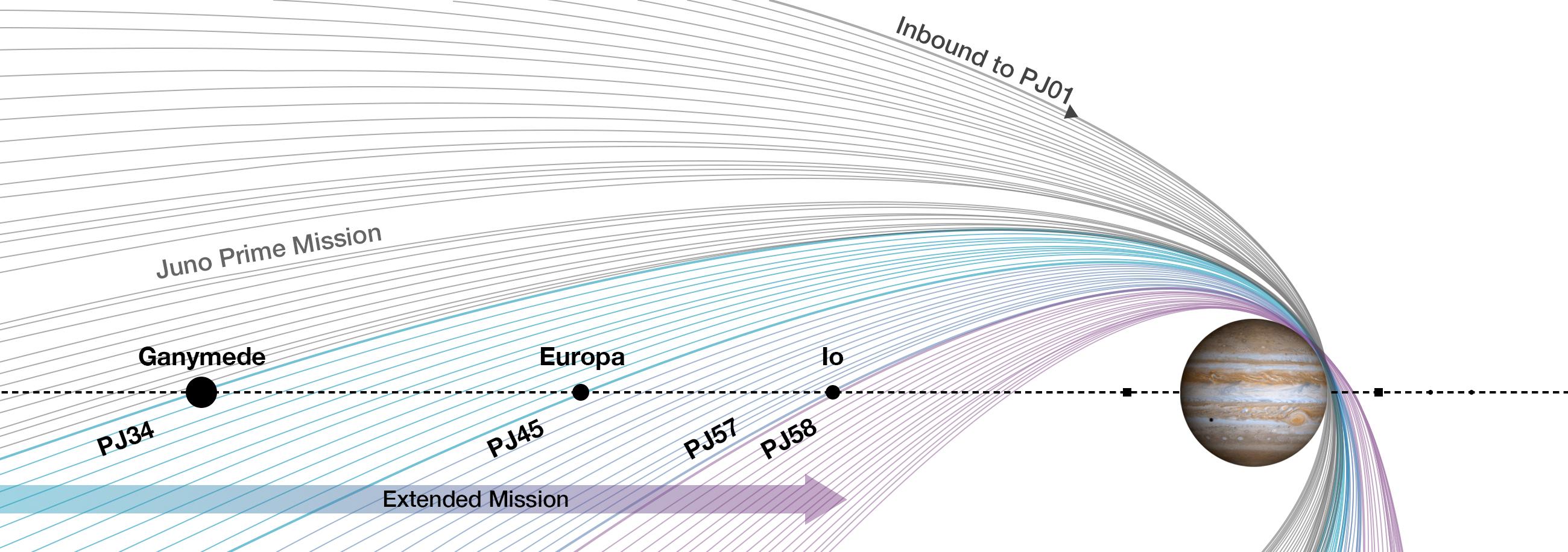
|
Juno’s Mission Goes On
- Click the image above for a larger view
- Full-Res JPEG (2600 x 916) (321.5 kB)
- Full-Res TIFF (2600 x 916) (1.8 MB)
Caption:
NASA has extended the mission of its Juno spacecraft exploring Jupiter. The agency's most distant planetary orbiter will now extend its investigation of the solar system's largest planet through September 2025, or until the spacecraft's end of life. This extension tasks Juno with becoming an explorer of the full Jovian system — Jupiter and its rings and moons — with multiple rendezvous planned for three of Jupiter's most intriguing Galilean moons: Ganymede, Europa, and Io.
The prime mission operations will be completed in July 2021. Involving 42 additional orbits, the extended mission expands on discoveries Juno has already made about Jupiter's interior structure, internal magnetic field, atmosphere (including polar cyclones, deep atmosphere, and aurora) and magnetosphere. It includes close passes of Jupiter's north polar cyclones; the first extensive exploration of the faint rings encircling the planet; and flybys of the moons Ganymede, Europa, and Io.
Background Info:
JunoCam's raw images are available at
https://missionjuno.swri.edu/junocam
for the public to peruse and process into image products.
More information about Juno is online at https://www.nasa.gov/juno and https://missionjuno.swri.edu .
NASA's Jet Propulsion Laboratory manages the Juno mission for the principal investigator, Scott Bolton, of Southwest Research Institute in San Antonio. Juno is part of NASA's New Frontiers Program, which is managed at NASA's Marshall Space Flight Center in Huntsville, Alabama, for NASA's Science Mission Directorate. Lockheed Martin Space Systems, Denver, built the spacecraft. Caltech in Pasadena, California, manages JPL for NASA.
Cataloging Keywords:
| Name | Value | Additional Values |
|---|---|---|
| Target | Jupiter | Europa, Ganymede, Io, Jupiter Rings |
| System | Jupiter | |
| Target Type | Planet | Ring, Satellite |
| Mission | Juno | |
| Instrument Host | Juno | |
| Host Type | Orbiter | |
| Instrument | JunoCam | |
| Detector | ||
| Extra Keywords | Atmosphere, Color, Magnetosphere, Visual | |
| Acquisition Date | ||
| Release Date | 2021-01-13 | |
| Date in Caption | ||
| Image Credit | NASA/JPL-Caltech/SwRI | |
| Source | photojournal.jpl.nasa.gov/catalog/PIA24308 | |
| Identifier | PIA24308 | |
